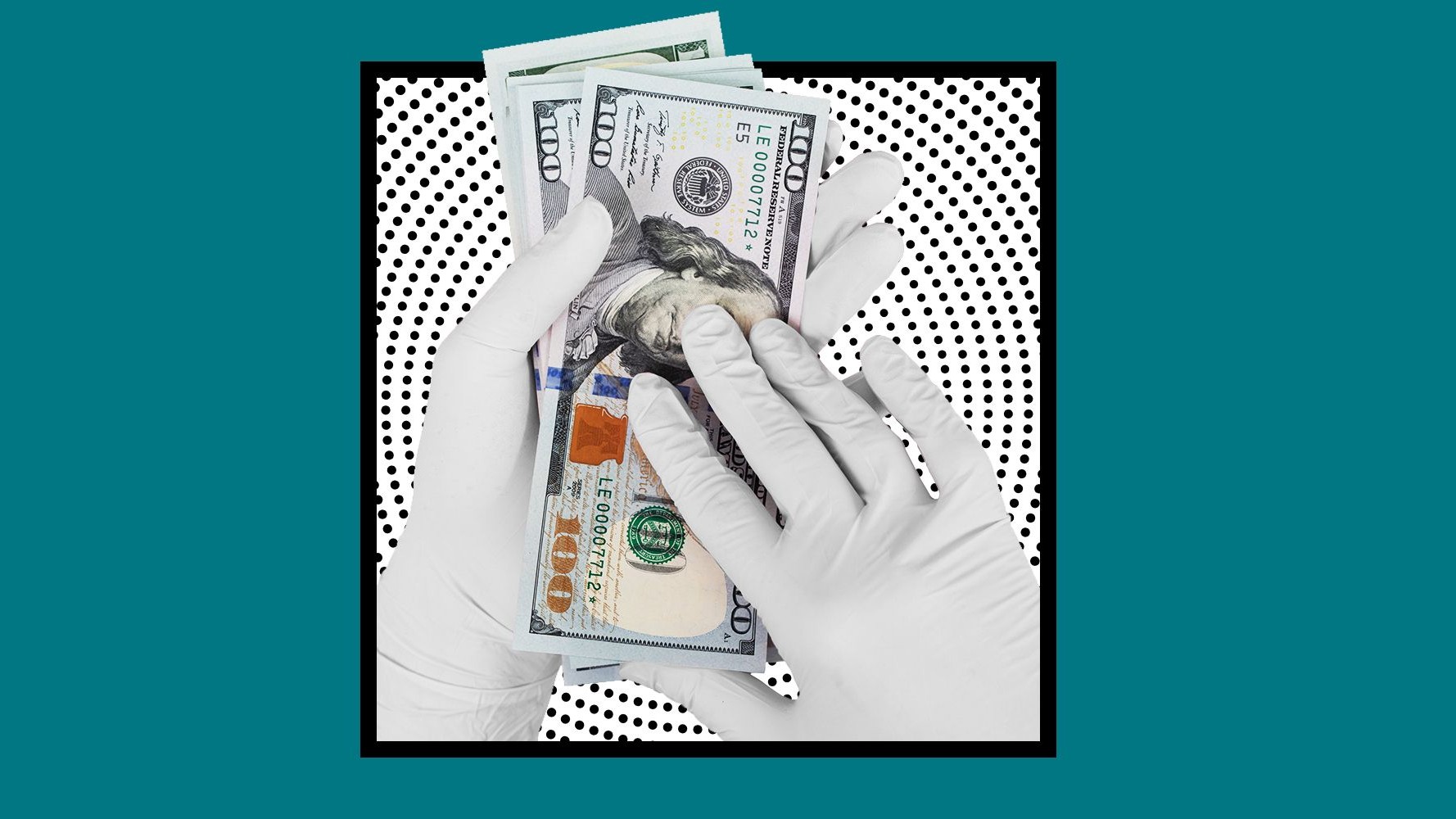What Should I Be Doing With My Money During the COVID-19 Pandemic?
Sallie Krawcheck, financial guru and CEO of Ellevest, explains.


You've heard it on the news, from your dad, and from your friends in banking: COVID-19 is catapulting the U.S. into an economic recession. It's a tumultuous time, but that doesn't mean you have to approach your finances blindly. We tapped Sallie Krawcheck, banking veteran and founder of female-focused financial planning service Ellevest, to answer your questions about investing and money management during the COVID-19 pandemic.
Everyone says we're on the brink of an economic depression. Is that true?
I started my career as a research analyst covering the stock market. I have always thought that the stock market talks to us and tells us what is happening, though sometimes it’s hard to interpret. The stock market is telling us that we are in a recession, probably a depression. It's telling us that by the fact that it has declined so much, so fast. It was the worst first quarter in 100+ years, and the fastest move from what we call a bull market (an upward trending, robust, strong stock market) to what's called a bear market, where we fall more than 20 percent (and our market has been down more than 30 percent).
Does that mean it's too late to sell stocks?
The number one and number two questions we get at Ellevest (and they change in order) is: Should I be buying and should I be selling? Typically, the answer to both is no. If you follow your instinct today and get out, you’re likely going to miss the upturn. The upturn after one of these declines tends to happen before it’s clear that we're coming out of the recession.
This idea of If I can see what's coming, can I take action? is wrong. What you should do is something called rebalancing your portfolio (meaning buying or selling assets to maintain a desired level of asset allocation or risk). Let’s say you started off with an investment portfolio that's made up of 70 percent equity and 30 percent bonds, which is a pretty risky portfolio. With that portfolio, over time you should earn higher returns. Because of what's going on in the stock market, maybe you're now no longer at 70-30, you're at 55-45. Maybe you want to go back to 70-30, which means you want buy equity and sell bonds. This rebalancing back to your goal can actually force you to make counter-intuitive decisions that you wouldn't otherwise make.
I literally just got into investing. Should I stop?
I would continue, assuming that you’re in good financial shape (you have an emergency fund and little debt). Don't look at your existing balance, because it's just going to upset you. By investing a percent of every paycheck, buying stocks low and selling them high, you’ll do much better than if you tried to guess the market. Even the people on CNBC, who talk so confidently on when it's the right time to buy and sell, typically do not do better than average. Remember, we have recovered from every single recession in history. If history is any guide, we will also recover from, this one, even if it's bumpy.
Should I still be contributing to my 401K?
Yes, assuming you can afford it. There is nothing historically anomalous about this stock market decline that says we won’t recover from it.
Every year, I make a contribution to my Roth IRA before taxes are due. Should I still do that?
Yep, absolutely. We all want to do things differently because it feels risky right now. But in fact, we will look at this period of time years from now and wish we had invested more, not less, and that we had not stopped contributing to our Roth IRA. We will say, shoot, I should have doubled and tripled down.
Get exclusive access to fashion and beauty trends, hot-off-the-press celebrity news, and more.
I’m recently unemployed due to COVID-19. What can I do?
It depends on your personal circumstance. You'll get the $1200 stimulus check, which will help. Unemployment will be expanded, particularly for people who didn't have unemployment insurance, like freelancers. But for some people, it will still mean spending through your emergency funds. For some people it's going to mean, unfortunately, running up credit card debt. If those things are happening to you, stop investing. Instead, go into conservation mode: You need to replenish your emergency fund and pay down credit card debt before you begin to invest again.
What steps can I take to restore financial health?
Sit down and make a list of every area where you're spending money and where can you begin to cut. Some obvious ones right now are going out to eat and travel. Use those funds to pay down credit card debt. The other thing that we're suggesting people do while stuck at home is what we call "smiling and dialing." Call your cell phone company to ask for a deal. Call your utility company. Call your cable company. Get rid of unnecessary subscriptions, like Netflix and Hulu. Call your student loan provider— student loan payments are waived for a couple of months, so take advantage of that. But if you've been paying them on time, call and ask them if they'll take down your interest rate. On credit cards where you could be paying interest rates of 18 percent, 22 percent, 25 percent, transfer your balance to a zero-balance card if you're able and use the money you save to pay down the principal balance. You're not going to save a million dollars, but it adds up to make a difference.
Everyone is talking about an emergency fund. What do I do if I don’t have one—and how can I start one?
Our recommendation has always been to build up a period of three to six months of take-home (after taxes) pay and put that money in a FDIC-insured savings account, which means the government insures that money. You don't earn a lot on it, but it’s insured. If you have not built an emergency fund, it’s never too late to start one. It's going to be a matter of what we just talked about: On the other side of all of this, where can you reduce expenses?
If you have savings and credit card debt, use your savings to pay off your debt. This may be a little counterintuitive, but your savings are not earning you anything, and the credit card debt is costing you a lot. You might say, well hold, on Sallie. What if I have an emergency? If you do, then you’ll run up your credit card debt again. Some people ask me, well, what if they cancel my credit card debt? That has never happened in history. It's not going to happen.
I’ve been saving for a short-term investment...like purchasing a home in five years. Help.
That goal is pretty near-term and you'll need to spend that money soon, so at Ellevest we wouldn't invest much in the stock market. The reason we don't is because of times like this [unexpected recessions]. More funds should be in bonds or debt. Whereas stocks are the ownership of a sliver of a bigger company, like IBM, debt or bonds actually owe you money. Debt tends to be less sexy than stocks because the stock market can go up, but for debt you only get back the amount you leant, with interest. Assuming your investments are done like this, you should be okay. It might take 6 months longer to buy your home, but you’ll still be able to do it.
Conversely, for a longer-term investment, like retirement, you should have more equity—which is more risk, but typically over time, it's a greater return.
Should I buy stakes in Clorox Wipes, STAT?
If you're doing that, you're probably too late. If you had figured out to invest in Clorox Wipes or Zoom weeks ago, you probably would have made a lot of money. But now everybody knows
Any other hot tips?
.Do not, do not, do not, do not, do not, do not trade Bitcoin. The other question we get, which is a little doomsday, is Should I buy gold? I love to joke with my husband and convince him that it's an investment. Think about it the gold of ancient Egypt—it’s still worth gold. The stocks and bonds of ancient Egypt aren't worth anything.
Wait, should I go buy myself a gold necklace?
You should buy gold for two reasons: One: It's beautiful. Two: It tends to hold its value. If you’re a person who's super nervous, you can always buy gold.
When do you predict the recovery of our economy will start?
I would expect more volatility in the stock market. I think it will get better before we fully recognize that we're coming out of the recession. I don't think we'll see a full recovery, frankly, until we have some resolution to the virus.
Every downturn feels worse than every one that came before when you’re actually in it. This one feels particularly tough because it's about our health. But, again, we have recovered from recession every time in history. This time, it may take a little bit longer, but the entrepreneurial spirit of the United States of America will come out on the other end and drive the stock market even higher.
Ellevest wants to answer your financial questions! Send them to questions@ellevest.com.
For more stories like this, including celebrity news, beauty and fashion advice, savvy political commentary, and fascinating features, sign up for the Marie Claire newsletter.
Related Stories


Megan DiTrolio is the editor of features and special projects at Marie Claire, where she oversees all career coverage and writes and edits stories on women’s issues, politics, cultural trends, and more. In addition to editing feature stories, she programs Marie Claire’s annual Power Trip conference and Marie Claire’s Getting Down To Business Instagram Live franchise.
